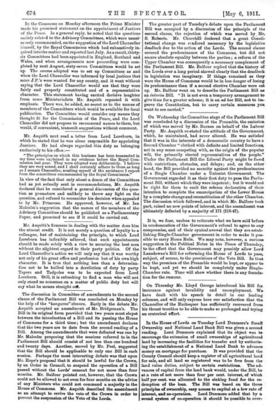The greater part of Tuesday's debate upon the Parliament Bill
was occupied by a discussion of the principle of the second clause, the rejection of which was moved by Mr. S. Roberts. Mr. Churchill declared that a great Consti- tutional change was rcndered necessary by the legislative deadlock due to the action of the Lords. The second clause secured the predominance of the Commons, but did not secure absolute equality between the parties ; a reform of the Upper Chamber was consequently a necessary complement of the Parliament Bill. Mr. Balfour replied that the history of the Lords over a long period showed clearly that the deadlock in legislation was imaginary. If things remained as they were the House of Commons would be in less danger of losing its predominance than if a second elective Chamber were set up. Mr. Balfour went on to describe the Parliament Bill as an interim BilL " It is not even a temporary arrangement to give time for a greater scheme; it is an ad hoe Bill, not to im- prove the Constitution, but to carry certain measures yon want to see carried."










































 Previous page
Previous page